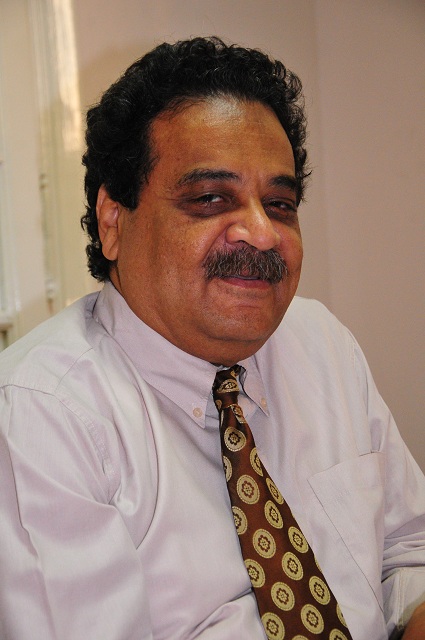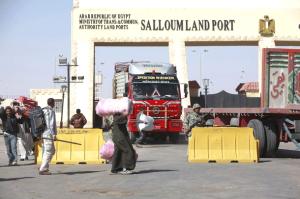 The process of Al-Tamkin is a phrase often used by Islamists, that can be traced back to the time of the Prophet (PBUH), which, according to various biographies, consists of two phases.
The process of Al-Tamkin is a phrase often used by Islamists, that can be traced back to the time of the Prophet (PBUH), which, according to various biographies, consists of two phases.
The first phase is Istada’af, (subjugation); Muslims during the time of the Prophet (PBUH) were often persecuted, and therefore often hid the fact that they were Muslims. Istada’af refers to the methods used and adopted by Muslims to endure persecution in societies that do not accept them.
The second phase of Al-Tamkin is also referred to as al-Tamkin, and refers to the time in history when God granted Muslims the power to defeat their hostile neighbours and establish the Caliphate. In modern terms, Al-Tamkin is used by many Islamic organisations to refer to overcoming adversity.
Islamic organisations of all stripes that participate in politics have borrowed from the past, take particular phrases and try to apply them to their modern day lives.
Shi’a Muslims are often champions of the notion of Al-taqia (dissimulation), as many branches of Shi’ism purposely conceal their beliefs, to the point that many act as underground movements, in order to avoid the dangers associated with making their identity public.
Sunnis on the other hand, which is how many Islamists in Egypt would describe themselves, have not been known to adopt methods of dissimulation except in circumstances where they face an ever present threat. However it is during this stage that God upholds his word and chases away the infidel.
Within both the stages of Al-Tamkin and Istada’af it is possible to say that there exists a series of small sub-stages, and that a sub-stage of Al-Tamkin in one instance may in fact be considered a sub-stage of Istada’af in another. Before the 25 January Revolution for example, the Muslim Brotherhood often existed quite publicly, operating local headquarters, and congresses, sometimes even speaking to the media.
All of this could be considered in some way a form of Al-Tamkin. However despite their public image, authorities often jailed dozens or sometimes hundreds of brotherhood members for long periods of time, in addition to rigging elections. These methods guaranteed that the Brotherhood would never be more than a minority opposition party in Parliament.
Taking into account the various forms of persecution they suffered during this period, it is also possible to say that this may have been a time of Istada’af for the Brotherhood, compared to what they have been able to accomplish recently.
The actions of the Muslim Brotherhood during this period could be seen as employing methods of dissimulation, as a means of hiding their true power for the purpose of biding their time and maintaining a role as an opposition movement.
Before the revolution, the Brotherhood often took part in protests as part of the democratic opposition to the Mubarak regime, and continued doing so until Mubarak stepped down on February 11, 2011.
However after the removal of Mubarak, their methods began to change, as they began to enter into the first of stage of Al-Tamkin. Once the announcement was made regarding parliamentary elections, the Brotherhood promised (based on the belief that they were not yet strong enough to lead) that their goal in taking part in the elections would only be to serve as a minority party that would form a government with a larger coalition.
However, once their power base amongst the Egyptian people began to grow, they began competing for more seats, and went on to contest the presidential elections despite the fact that they had promised not to run a candidate. They went back on their word a third time when they appointed Hesham Qandil to the position of prime minister after previously promising to appoint an individual experienced in politics.
In all of these cases, the Muslim Brotherhood was never content with exercising limited power, they instead went back on their promises when their power increased, and as a result they gradually moved from being in a state of Istada’af to al-Tamkin. The main difference between the two stages for the Muslim Brotherhood was the extent to which they would apply dissimulation to their politics and mask their true intentions.
The practice of reneging on their promises was no mistake, but rather was and is a calculated policy on the part of the Brotherhood to move from the stage of Istada’af to Al-Tamkin. The Muslim Brotherhood does not view any promises made during the period of Istada’af as ones they are expected to keep or uphold, and furthermore do not consider going back on their word in such a circumstance to be immoral.
Perhaps one can justify this by referring to it as continued dissimulation, taking necessary measures to ensure one’s survival, along the lines of that done by the Prophet (PBUH). But this is merely a claim that gives liars a cover against sin. Before the 25 January revolution the notion of the Muslim Brotherhood going back on its word had become normal and was not an issue that drew much attention.
However after the revolution, and with the speed with which unprecedented change swept Egypt, the scope of the Muslim Brotherhood’s lies expanded, and the time it took them to break their promises started becoming shorter and shorter, often not exceeding weeks or days or even a matter of hours.
Before the revolution, the Muslim Brotherhood could claim that they often changed their positions as a result of shifting circumstances, however after the revolution it became clear to the Egyptian people that their tendency to flip flop was not merely circumstantial, but rather was an ingrained part of their identity as a movement, a fact that would later cost them a large amount of support.
It is necessary to state here that like many other Islamist organizations, the Muslim Brotherhood believes in the notion that “war as trickery,” an Arabic phrase that can also be traced back to the Hadiths of the Prophet (PBUH), and they have employed it much in the same way they have dissimulation.
The practice of reneging on promises can be considered to be a part of the notion of war as trickery, and it is upon you my dear reader to realise that the Brotherhood does in fact consider itself at war, and that it is within this context of war that they are allowed to practice the idea of dissimulation.
The announcement of the new constitution is therefore just the latest in a series of steps leading up to Al-Tamkin, which at its core is rooted in what the Muslim Brotherhood considers to be a strategic change in the political landscape that will enable them to further pursue their ultimate goal of establishing an Islamist state and expelling those who stand in their way.
What was the strategic shift that took place in Egyptian politics that enabled the Muslim Brotherhood to draft this constitution, and how did it take place? We must return to the beginning, to the days of the 2011 revolution, and ask what forces were involved between 25 January and 11 February in ousting Hosni Mubarak?
We can agree that there were three main forces primarily responsible for ousting Mubarak, the first being the Egyptian people, and the participation of citizens of all different stripes in working to end a dictatorship. The second being the army, who refused to support Gamal Mubarak as the heir of the Mubarak dynasty. The last force being the west, specifically the United States, who saw that Mubarak had lost his legitimacy and was no longer able to protect their interests. Of course there are differences in opinion about which force played the biggest role in ousting Mubarak.
Opinions abound; some say that the American role had only been to provide political cover to the Egyptian revolutionaries, while others claim that the army contributed nothing other than simply being neutral. Regardless of what has been said, what is important is that the regime was ousted in just 18 days. Whether certain forces contributed more or less by remaining neutral or being active in the streets is of less importance.
Now, just days before the announcement of Morsy’s constitutional declaration the Muslim Brotherhood was able to live out it’s dream, at the expense of Israel and the United States by acting as the primary mediator in a cease-fire between Israel and Hamas. This move not only undermined the Palestinian cause, but also ignored Egypt’s security concerns.
There is no doubt that Egypt’s role in brokering the cease fire is the first in a series of steps that will lead to the Gaza Strip becoming a part of Egypt, which will be naturally followed by Jordan annexing the West Bank, two moves that will put an end to the dream of an independent Palestinian state and lead to permanent lawlessness in the Sinai Peninsula.
As far as the army is concerned, the Muslim Brotherhood has given them everything they could ever want.
No one can know whether Morsy actually received official support from the United States and the Egyptian armed forces regarding the declaration before its release, or whether he hoped to obtain it after the fact, based on the belief that he had given both parties everything they had wanted so much that their support was guaranteed.
Again, whether or not this was the case is not important. In Morsy’s eyes the Muslim Brotherhood/Islamist brand had the support of nearly 70 per cent of the Egyptian people (if one takes into account the Egyptian parliamentary elections) and had already reached a level of Al-Takmin that would give them the power to go after the Egyptian judiciary, unilaterally draft a constitution, and sack those who didn’t support their policies, even those who had previously been allies.
The history of political Islam, and the Muslim Brotherhood in particular, consists of alliances being broken as soon as one party believes it can be stronger and accomplish more on its own. The phrase “we eat lunch with them before we have dinner with them” comes to mind.
The Muslim Brotherhood has formed and broken alliances with Al-Naqrashi, Abd-al Nasr, Anwar Sadat, Hosni Mubarak, and even the United States in Kabul. All of these alliances were based on promises made, promises they inevitably went back on as soon as they felt they had moved from a phase of Istada’af to that of Al-Tamkin.
Now, the Muslim Brotherhood’s understanding of their current situation is as follows: if we’ve obtained the support of 70 per cent of the people, in addition to that of the Egyptian Armed Forces and the United States, are we not able then to impose our vision of an Islamic state upon Egypt? The constitutional declaration was the first step in this process, as it attacked the independence of the judiciary, and sought to grant control over it to their supporters. The media has also come under attack, starting by shutting down the Dream network.
Notice my dear reader that this is the very same channel that was ordered to return to work recently by judicial decree. But of course, the decisions of the president now and forever override those of any judicial power.




